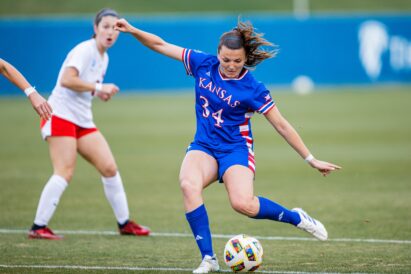Touting it as one of the biggest single donations in the history of college sports, the University of Kansas athletic department announced on Wednesday morning that it had received a gift of $300 million from donor David Booth.
The donation, which is also the largest ever to the university, includes $75 million to help jump-start the upcoming second phase of KU’s Gateway project. Plans for that phase include a hotel, retail development and student housing surrounding the stadium that already bears Booth’s name on its marquee.
“David’s unprecedented generosity is transformative now and for our future,” KU athletic director Travis Goff said in a press release. “It accelerates phase II of the Gateway District and the new ‘Booth’ and inspires others to step up and join in completing this vision. We’re profoundly grateful for David’s leadership and extraordinary impact on generations of student-athletes and fans. There is no more generous and impactful Jayhawk, and we are so fortunate to call him a friend and mentor.”
Booth’s donation closely follows a major procedural step for the Gateway project. The Lawrence City Commission on Tuesday night voted to approve a maximum of about $94.6 million in a variety of financial incentives, including STAR bonds and a Tax Increment Financing district. Under the terms of the city’s agreement with KU, that total would account for about 27% of the phase’s overall costs.
That means Booth’s gift, in and of itself, could add another 21%. Put another way, his $75 million could provide approximately half of the $157 million in stadium renovation costs, according to KU’s development agreement with the City of Lawrence, that account for a significant portion of the second phase of construction.
KU, and Booth himself, also characterized the gift as a “challenge to other donors” that would inspire them to contribute to the upcoming phase.
“One of life’s greatest privileges is being able to give back to the people and places that gave so much to you,” Booth said in the release. “KU and Lawrence are a big part of my story, and it means a lot to support the community that invested in me. Philanthropy, like investing, pays dividends over time. Each gift compounds, creating opportunities not just for today, but for years to come. This is really about the future we’re building.”
Booth is a graduate of Lawrence High School and KU who co-founded the investment firm Dimensional Fund Advisors and currently lives in Austin, Texas. In 2017, Booth provided $50 million toward football stadium renovations, which was at the time the largest gift in the history of KU’s athletic department, and also led to the stadium’s renaming after him. He previously helped fund the creation of the Booth Family Hall of Athletics at Allen Fieldhouse, and gave KU the original rules of basketball, which are located in the DeBruce Center.
KU Chancellor Douglas Girod said in the press release that Booth “has always believed in the power of athletics to unite communities, generate Jayhawk spirit and create lasting bonds between alumni, students and fans.”
This is not the first time Booth has donated $300 million at once, as he did so in 2008 in a gift to the University of Chicago’s business school — his other alma mater — which now also bears his name.
Booth’s contribution of $75 million toward the second phase of construction closely follows a gift of $25 million from Paul and Linda DeBruce that KU announced on Aug. 6, which will also contribute to the Gateway project.
As for the remaining $225 million from Booth, KU’s announcement makes reference to “continued changes in NCAA and conference dynamics” and the recent implementation of direct revenue sharing with athletes — as a result of the House v. NCAA settlement that went into effect on July 1 — as it states that additional money “will help enable KU to take the next step in cementing itself as a national leader in college athletics.” The release suggests it will create a continuous source of income.
KU officials have previously said the plan for the second phase of the project is to begin construction following the conclusion of the 2025 season. Goff has also said that KU plans to find ways to continue to play inside the stadium while the second phase is in progress, potentially with reduced capacity or some sort of ersatz seating available on the east side of the venue.
In the meantime, the university is just days from completion of the first phase of the Gateway project, as David Booth Kansas Memorial Stadium officially reopens for the KU football team’s game against Fresno State on Aug. 23. The conference center located in the stadium’s north bowl is expected to open in earnest in October.

 MultiStudio/University of Kansas
MultiStudio/University of Kansas